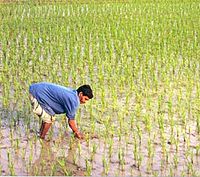
Photo from wikipedia
In Pb-factored soils, soil application of appropriate inorganic amendment along with cultivation of salt-tolerant crop species/genotypes for Pb immobilization can be a good choice. Hence, in saline-sodic and non-saline/sodic Pb-factored… Click to show full abstract
In Pb-factored soils, soil application of appropriate inorganic amendment along with cultivation of salt-tolerant crop species/genotypes for Pb immobilization can be a good choice. Hence, in saline-sodic and non-saline/sodic Pb-factored soils, Pb immobilization was observed as influenced by exogeneously applied inorganic amendments. Salt-tolerant rice cultivar Shaheen basmati was grown in present study. The current pot study consists of two factors: three inorganic amendments (i.e., gypsum, rock phosphate and di-ammonium phosphate) each with their three increasing rates along with uncontaminated and contaminated controls, and two types of Pb-factored soils (non-saline/sodic and saline–sodic). At harvest maturity, crop was reaped and straw, paddy yields and height of plant were noted. The results showed that Pb induced decrease in rice growth and physiological attributes (i.e., transpiration rate, photosynthetic rate, stomatal conductance, chlorophyll a , b and carotenoids) were significantly ( p ≤ 0.05) counteracted by exogeneously applied inorganic amendments. Among the tested amendments, the highest gypsum application rate of 9 me Ca 100 g −1 soil was proved the most effective to improve rice growth, yield, physiological functions, and to reduce Pb concentration in rice both in saline-sodic and non-saline/sodic Pb-factored soils.
Journal Title: Paddy and Water Environment
Year Published: 2020
Link to full text (if available)
Share on Social Media: Sign Up to like & get
recommendations!